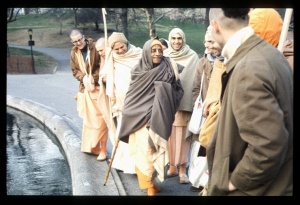SB 1.7.19 (1964)

A.C. Bhaktivedanta Swami Prabhupada
TEXT No. 19
- Yada asaranam atmanam aikshata srant avajinam
- Astram brahmasiro men atmaranam dwijatmajah.
ENGLISH SYNONYMS
Yada—when. Asaranam—without being alternatively protected, Atmanam—his own self, Aikshata—saw, Srantavajinam—the horses being tired, Astram—weapon, Brahmasiro—the top most or ultimate (nuclear), Mena—applied, Atmatranam—just to save himself, Dwijatmajah—the son of a Brahmin.
TRANSLATION
When the son of a Brahmin saw it that his horses were also tired, then he considered no other alternative for protecting himself than the use of the ultimate weapon known as Brahmastra (nuclear weapon)
PURPORT
At the ultimate issue only when there is no other alternative protection or conquering, the nuclear weapon called the Brahmastra is applied. The word Dwijatmajah is significant here because Aswatthama although the son of Dronacharya, he was not exactly a qualified Brahmin. The most intelligent man is called a Brahmin and it is not an hereditary title. Aswatthama was also formerly called as the Brahma-bandhu or the friend of a Brahmin. A friend of a Brahmin or the son of a Brahmin does not mean that one is Brahmin by qualification. Such friend or son of a Brahmin when fully qualified can be called a Brahmin and not otherwise. Aswatthama's decision being immatured he is purposely called herewith the son of a Brahmin.